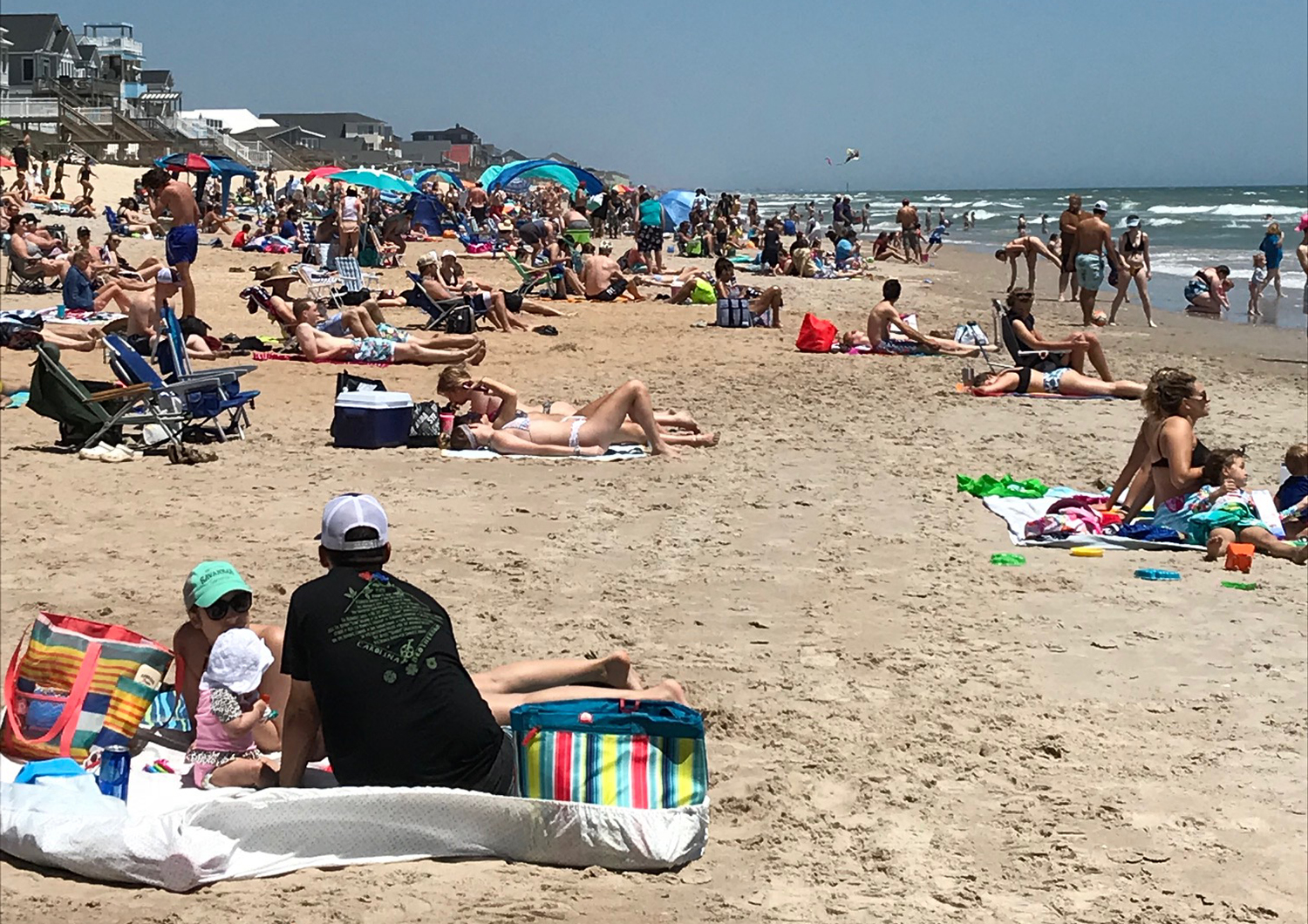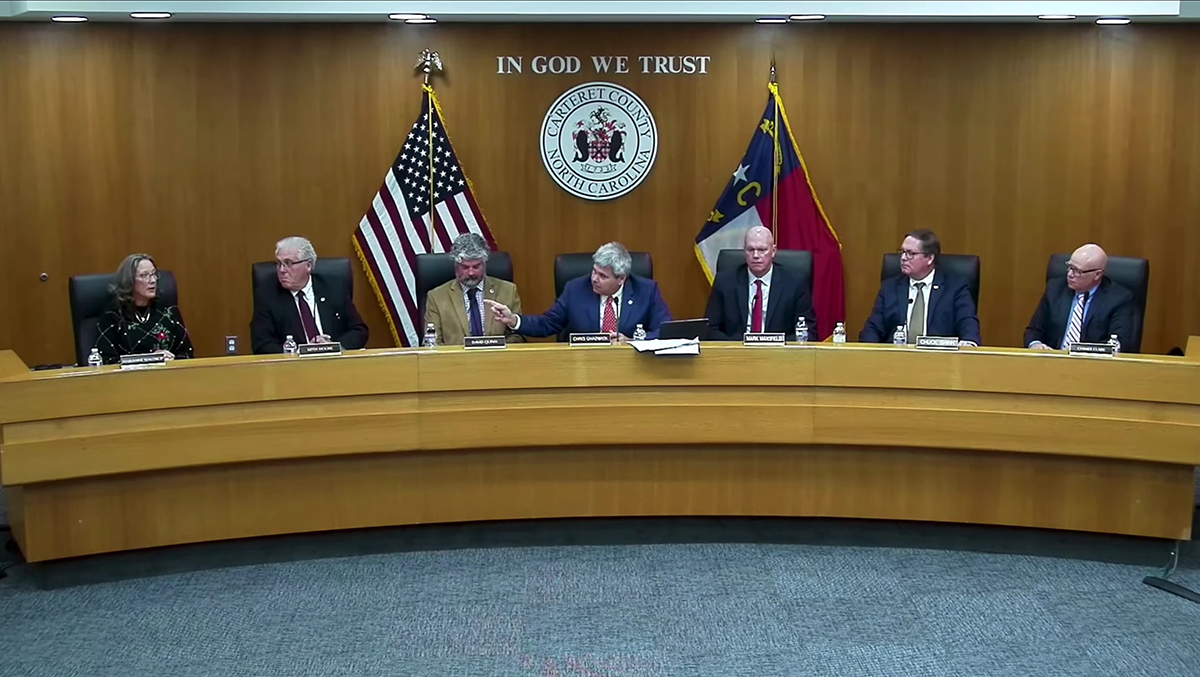
The beaches are open, and locals as well as out-of-towners, all eager to escape the confines of their home, are heading to their favorite beach. Perhaps the lure of sun and surf has never been so enticing as folks yearn for some fun, freedom and escape from the restrictions imposed during COVID-19 lockdown.
The good news is that the beach is a great place to be. The chances of getting infected from COVID-19 are low, as the ocean breeze disperses the droplets that contain the virus, according to Frank Scholle, associate professor in biological sciences at North Carolina State University.
Supporter Spotlight
However, to keep the virus in check, it’s essential that all beachgoers practice social distancing. Otherwise, we could see outbreaks such as those that occurred in Florida in February, warned Cameron Wolfe, associate professor in Duke University’s infectious disease division.
“I’m cautiously optimistic that people will recognize they all have a responsibility to do a good job with some level of social distancing, and we can open the beaches and do it safely,” he said. “If we forget all the lessons learned in the last three months, I have anxiety.”
Last weekend, beachgoers seemed to be taking social distancing seriously. Most kept a good 6 feet or more of sand between themselves and other families. Many planned to move to another spot if their area became congested or to go to another beach altogether.
“We’re staying away from everyone,” said Dan Bruno, a Wilmington native who was at Wrightsville Beach with his daughter Sunday morning. “It’s really important that everyone adhere to some kind of rules.”
Many beaches, including those at Wrightsville Beach, Carolina Beach, Surf City and on the Outer Banks, took measures to ensure the beaches were safe. Lifeguards, police, National Guard members or volunteers patrolled the beaches and reminded families to stay 6 feet from other groups and to follow the ordinances each town has enacted.
Supporter Spotlight
“Many tourists don’t know that they need to practice social distancing at the beach,” explained Sheila Nicholson, executive assistant to Carolina Beach’s town manager. “It’s an educational process.”
Regardless of parental or official admonitions, social distancing proved to be hard for some children. A few little ones ran right up to strangers, and others regularly traded sand pails and shovels. Some young people shared cell phones and sodas.
To ensure children stay safe, Lisa Brown, New Hanover County’s public preparedness coordinator, recommended explaining to children what they can and cannot do before visiting the beach and determining whether they can handle the environment.
“You have to know your family and how good they are going to be at social distancing,” said Brown.
Though no one was wearing a mask at the beach — there is that issue of a really funky tan line – health officials said it’s not a bad idea, especially if the beach is crowded.
Another recommendation is to keep beach trips short. This may be a necessity as numerous beaches have closed public bathrooms. Those that are open should be avoided, said Scholle.
“Bathrooms, especially on the beach, are not the cleanest, and it’s a small space,” he added.
Further, the longer people are at the beach, the more comfortable they become, said Brown. That’s when they may let down their guard and forego social distancing.
Another time when people relax is when they leave the beach. Looking at the activity in coastal communities Sunday, it was easy to forget there’s a pandemic. People crowded the streets of Wrightsville Beach, riding bikes, strolling along the sidewalks and passing within 2 or 3 feet of each other. Long lines formed for Carolina Beach’s Britt’s Donuts, where people sort-of social distanced from each other.
These are common and expected behaviors when beachgoers take a break from the seashore for some food, drinks or conviviality. That’s also when it’s most likely the virus will spread, said Wolfe.
“The beach isn’t the problem,” Wolfe said. “It’s what people do outside the beach. They crowd the ice cream vendor, sit down in close proximity in a restaurant beside the beach. Thirty people gathering and sharing large drinks is not social distancing.”
Instead, Wolfe recommended that people bring their own food, separate utensils for everyone in the family and take hand sanitizer to the beach. He also reminded beachgoers to keep social distancing in mind. They may also want to wear masks for that extra bit of protection.
If last weekend was an indication, beach popularity is at a record high. Surf City was as crowded as it was on July Fourth in years past, said Denise Lippert, administrative assistant for the Surf City Police Department.
Public parking at Carolina Beach was filled by 12:30 p.m., said Nicholson. The beaches will likely be as busy or busier during the long Memorial Day weekend.
“We could see quite a surge,” Brown said. “It’s great weather, and people are tired of being cooped up.”
To keep everyone safe, in addition to taking the precautions mentioned above, residents and visitors alike should be prepared to adjust their beach plans, Brown said. Their Plan B could be moving to another, less crowded beach or going to a park for part of the day.
“Be ready to be flexible,” Brown said. “Don’t put yourself in a higher area of risk.”
Additionally, those planning Memorial Day gatherings for family and friends should take steps to minimize the risk of the virus spreading. Brown recommended limiting gatherings to 10 people or fewer, holding the event in a park so people can spread out and ensuring the gathering lasts only a few hours rather than all day.
If someone must hold a gathering at their home, the host should determine if everyone will use the same restroom and how the interior of the home will be kept sanitized.
“We must plan ahead, think through the potential risks, and how to manage or avoid them,” Brown said.







